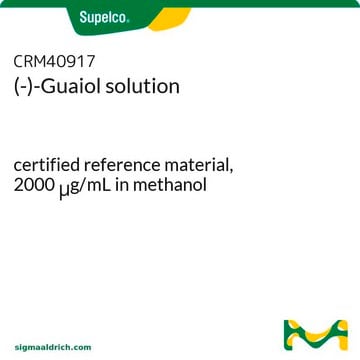86476
γ-Terpinene
analytical standard
Synonym(s):
1-Isopropyl-4-methyl-1,4-cyclohexadiene, p-Mentha-1,4-diene
About This Item
Recommended Products
grade
analytical standard
Quality Level
vapor density
4.7 (vs air)
vapor pressure
~0.7 mmHg ( 20 °C)
Assay
≥98.5% (GC)
shelf life
limited shelf life, expiry date on the label
technique(s)
HPLC: suitable
gas chromatography (GC): suitable
refractive index
n20/D 1.474 (lit.)
n20/D 1.474
bp
182 °C (lit.)
density
0.85 g/mL at 25 °C (lit.)
application(s)
cleaning products
cosmetics
flavors and fragrances
food and beverages
personal care
format
neat
storage temp.
2-8°C
SMILES string
CC(C)C1=CCC(C)=CC1
InChI
1S/C10H16/c1-8(2)10-6-4-9(3)5-7-10/h4,7-8H,5-6H2,1-3H3
InChI key
YKFLAYDHMOASIY-UHFFFAOYSA-N
Looking for similar products? Visit Product Comparison Guide
General description
Application
γ-Terpinene may be used as an analytical reference standard for the quantification of the analyte in Thymus vulgaris L. oil samples using gas chromatography coupled to mass spectrometry (GC-MS).
Other Notes
Signal Word
Warning
Hazard Statements
Precautionary Statements
Hazard Classifications
Aquatic Chronic 2 - Flam. Liq. 3 - Repr. 2
Storage Class Code
3 - Flammable liquids
WGK
WGK 2
Flash Point(F)
124.9 °F - closed cup
Flash Point(C)
51.6 °C - closed cup
Personal Protective Equipment
Choose from one of the most recent versions:
Already Own This Product?
Find documentation for the products that you have recently purchased in the Document Library.
Customers Also Viewed
Protocols
Fast GC analysis of sweet orange essential oil in hexane. Key components identified includes: β-Farnesene; α-Huµlene; Germacrene D; (+)-Valencene; Bicyclogermacrene; (+)-δ-Cadinene
Our team of scientists has experience in all areas of research including Life Science, Material Science, Chemical Synthesis, Chromatography, Analytical and many others.
Contact Technical Service












